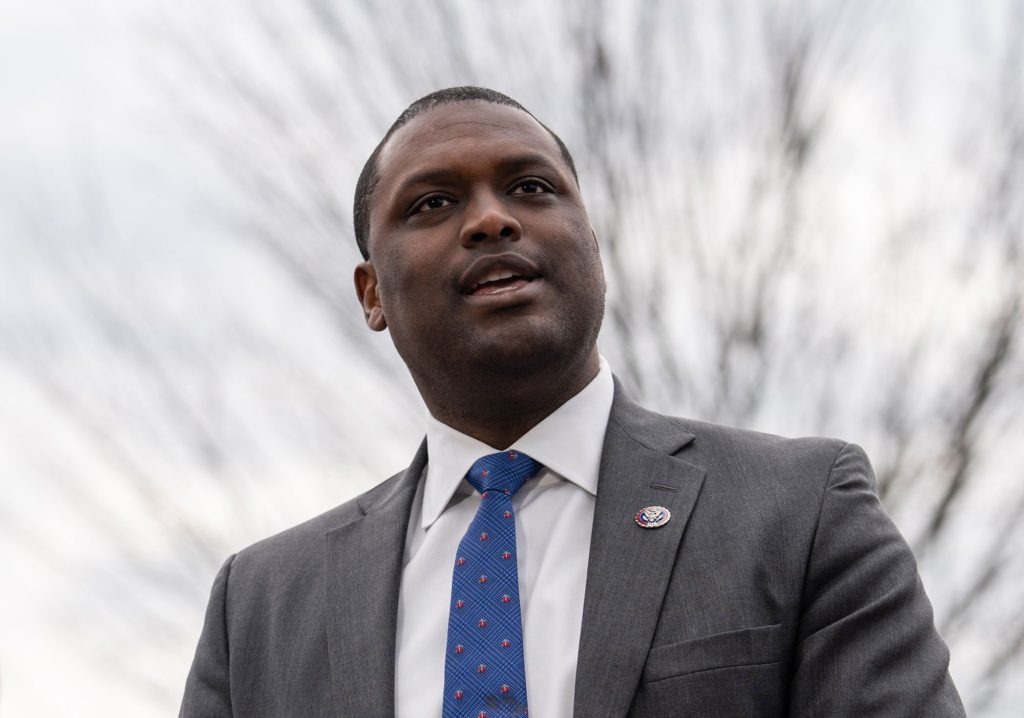Mondaire Jones spent much of his 35 years hiding his sexuality. As one of the first openly gay Black members of Congress he spent the past two years fighting for equality.
(Bloomberg) — Mondaire Jones spent much of his 35 years hiding his sexuality. As one of the first openly gay Black members of Congress he spent the past two years fighting for equality.
For him, the Tuesday signing by President Joe Biden of a law enshrining federal protection for same-sex marriage, will be a seminal moment but far from the end of the line.
“It’s already the case that the Respect for Marriage Act doesn’t go far enough, because it still would not ensure marriage equality in every single state in the union,” Jones, who represents New York’s 17th District, said in an interview. “So, it’s a great step in the right direction, but it’s not nearly going to be enough if it’s the only thing that we do.”
It’s also personally bittersweet given that his nascent congressional career was cut short after the progressive Democrat lost a bid for reelection in a midterm cycle that ultimately saw his party perform better than expected. Democrats held the Senate but lost control of the House of Representatives, which Jones had joined in 2021 as one of the most talked-about young lawmakers.
Closing out his term representing Rockland County and portions of Westchester County, Jones is deeply concerned that a pending Supreme Court case will open “a new wave of discrimination against LGBTQ+ people.”
The case in question involves a Colorado graphic designer who cited her religious beliefs and freedom-of-speech rights to say the state’s anti-discrimination law should not require her to create a website for same-sex couples. Conservative justices, who are in a majority on the court, appeared sympathetic to that argument.
The case touches a nerve for Jones. Back in June 2011, when the New York State Assembly passed a bill to legalize same-sex marriage, he was still a closeted man. He recalls that on hearing the news, he closed the door to his room, afraid that his roommates would find out about his sexuality, and cried tears of joy alone.
Though he will be out of elected office as of January, Jones plans to use his newly-found voice not just for advocacy but also to campaign for Democrats in the 2024 election cycle.
He told New York’s News 12 in a report on Monday night that he would be appointed by House Speaker Nancy Pelosi to the US Commission on Civil Rights. He said that the appointment “doesn’t keep me from doing other things, including from running for office.”
Jones was raised in Rockland County by a single mother, and they lived in Section Eight housing and on food stamps. She worked multiple jobs to take care of him and his grandparents stepped in to help. His grandmother, who cleaned homes, had to take him to work with her when daycare became too expensive.
He overcame a difficult childhood, and graduated from Stanford. He worked for the Justice Department during the Obama administration, then went on to Harvard Law School. After that, he moved to New York City to work as a litigator.
When Jones was elected to the House in 2020, his experience fueled his fight for LGBTQ+ rights. He quickly became a rising star in Congress. As a member of Pelosi’s team and the Congressional Progressive Caucus, he collectively sponsored more than 600 bills, many intended to provide funding or services to aid the LGBTQ+ community.
“It’s unlike anything I ever imagined growing up, I never thought that I’d be able to run for Congress, get elected and then help introduce legislation that I would ultimately vote on,” Jones said.
In his second month as a member, he voted in support of the Equality Act, which would ban discrimination based on sexual orientation and gender identity. It’s a bill Jones says is especially necessary now given the pending Supreme Court case.
As for his political future, Jones remains coy and does not rule out another run: “I’m not closing the door to anything, other than doing nothing, these next two years. That’s not who I am,” he said. “I’m always going to be active. I’m always going to be fighting for the communities that I represent, even if I’m not formally their elected in the United States Congress these next two years.”
More stories like this are available on bloomberg.com
©2022 Bloomberg L.P.










